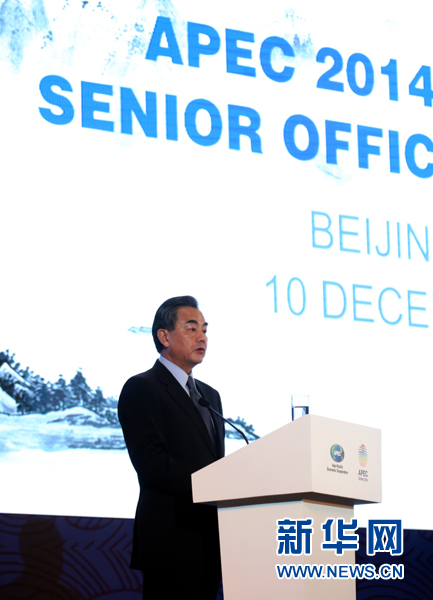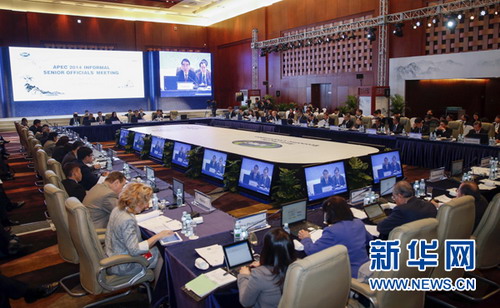
The People’s Republic of China



On Dec. 10, 2013, the APEC Informal Senior Officials' Meeting was held at China National Convention Center in Beijing. Foreign Minister Wang Yi attended the meeting and delivered a speech, and Vice Foreign Minister Li Baodong chaired the meeting. About 200 people, including senior officials and representatives from the 21 APEC economies, APEC Secretariat Executive Director, observers and others attended the meeting.
At the meeting, China reported to the APEC members the theme and key topics of the 22nd APEC Economic Leaders' Meeting in 2014. The theme of the meeting is "Shaping the Future through Asia-Pacific Partnership", and the three topics are "advancing Asia-Pacific regional economic integration", "promoting innovative development, reform and growth of the economy", and "strengthening comprehensive infrastructure and connectivity construction". The meeting also discussed the implementation of the fruits of the 21st APEC Economic Leaders' Meeting in Bali this year, arrangements of major meetings in 2014, and other issues.
At the meeting, Foreign Minister Wang Yi made a speech, with the title of "Continue with The Past and Open up The Future-- Shaping the Future through Asia-Pacific Partnership". Wang Yi said that 2014 is the 25th anniversary of the establishment of APEC, and over the past 25 years, APEC family has carried out cooperation in promoting trade and investment liberalization and facilitation, in promoting economic and technical cooperation and in other various areas, and has achieved fruitful results. China becomes the host again after 13 years, deeply feels the heavy task on its shoulders, and is willing to work with various APEC members to explore the new historical mission of APEC. China puts forward the theme of "Shaping the Future through Asia-Pacific Partnership", and hopes to build closer partnership across the Pacific to jointly cope with challenges and to seek long-term development of the Asia-Pacific. In 2014, APEC should make unremitting efforts to promote the Asia-Pacific regional economic integration, to offer a strong driving force to promote the regional economic growth, and to pave the way for the realization of the Asia-Pacific connectivity.
Wang Yi stressed that APEC cooperation should aim to benefit members across the Pacific, feature the integration of hardware, software, and people-to-people and cultural exchanges, and adhere to developing economy and improving people's livelihood to promote the realization of the big market, the big connectivity, and the big development of the Asia-Pacific. APEC should consolidate cooperation foundation, adhere to the cooperation concept, promote cooperation achievements, and strengthen cooperation guarantee. China will take the 2014 meeting as an opportunity to join hands with all parties to make new contributions to advancing the construction of the Asia-Pacific partnership facing the future, to promoting the sustained development, progress and prosperity in the Asia-Pacific region.

The 22nd APEC Economic Leaders' Meeting in 2014 will be held in Beijing, and a series of meetings, such as the sectoral ministerial meetings, the senior officials' meeting and other relevant meetings will be held in China. Established in 1989, APEC is an economic cooperation mechanism that is of the highest level, covers the widest fields, and is the most influential in the Asia-Pacific region. It has 21 members at the moment. Since its establishment, APEC has continued to make progress in promoting regional trade and investment liberalization and facilitation, in promoting economic and technological cooperation, and in other fields, playing an important and positive role in driving the global and regional economic growth.


